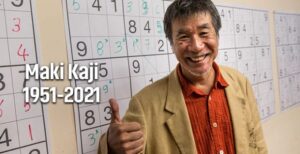
Sudoku is a number game in which missing numbers are to be filled into a 9 by 9 grid of squares which are subdivided into 3 by 3 boxes so that every row, every column, and every box contains the numbers 1 through 9.
- Sudoku is not just a “corresponding” name for this puzzle. In Japanese “Su” means a number, while “Doku” means only/single. So Sudoku means “only single digits”.
- Actually, Sudoku isn’t a Japanese game it all. It is American invented. Howard Garns created it as Number Place in 1979 but died in 1989 before Japanese publisher Nikoli got a hold of it. The game didn’t really take off until 2004 though when Wayne Gould convinced The Times in London to publish it.
- When Sudoku became a world hit in 2005, it is estimated that it is the biggest phenomenon since the Rubik’s Cube in the 1980s.
- In the year following Sudoku going viral, pencil sales are said to have increased by around 700%.
- Sudoku is a logic game and involves absolutely no math or language skills.
- There are 6670903752021072936960Sudoku grids. However, the essentially different Sudoku grids are only 5,472,730,538. Lifetime is not enough to solve all the grids.
- You don’t need to be an expert to make a Sudoku puzzle. Anyone with basic logical reasoning can make a Sudoku puzzle within minutes.
- There is a minimum number of clues to be given for the Sudoku puzzle to have one solution. The least number of clues of a given Sudoku with a unique solution is 17.
- The fastest recorded time to complete a Sudoku puzzle was 1 minute 23.93 seconds, as the Guinness World Records says. The record was set on May 20, 2006 by Thomas Snyder, an American Sudoku champion.
- Arto Inkala, a Mathematician from Finland, claims to have come up with the “world’s hardest Sudoku” in 2012. Typically Sudoku difficulty is graded with 1 star being easy and 5 stars being very hard. According to Britain’s The Telegraph newspaper, Inkala’s Sudoku would be graded 11 on the difficulty scale!
- There is a worldwide Sudoku Championship every year since Mar 2006. The first World Sudoku Championship was held in Lucca, Italy.
- Sudoku is good for anyone and any age and helps develop mental abilities as well as keeps them in good condition.
- Playing Sudoku regularly can have benefits, like boosting your concentration and focus, lowering blood pressure, preventing or easing depression and possibly even preventing dementia and Alzheimer’s disease.
- Sudoku is considered highly addictive and considered as one of the good addictions.
Recommendation
If you did not already know it, Sudoku is a fun game that is great as a pass-time and a mental workout too. If you are looking for a game that can prove to get easier over time and present a challenge for your mental capacity, Sudoku it is. Whether you are young or old, this game offers the opportunity to occupy your mind while it provides a variety of other physical and mental health benefits too.
Question
What are you waiting for?
Titbits
Sudoku inadvertently obstructed justice by interfering with a court case (probably more than once). In Australia, 5 Jurors were caught playing a sneaky game of Sudoku instead of paying attention to evidence being presented.
Value additions are most welcome
For regular updates, please register here

